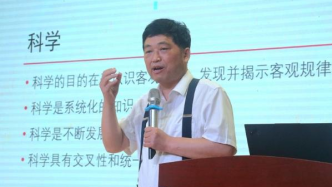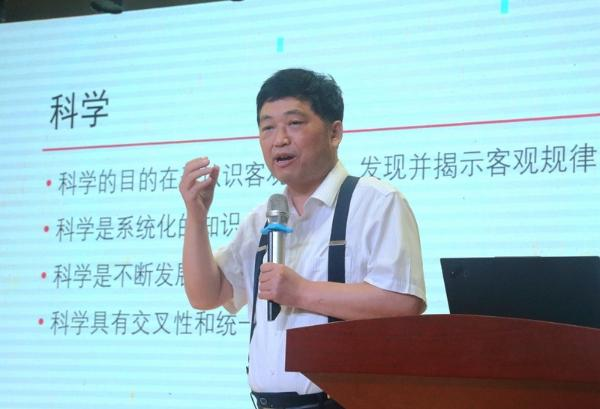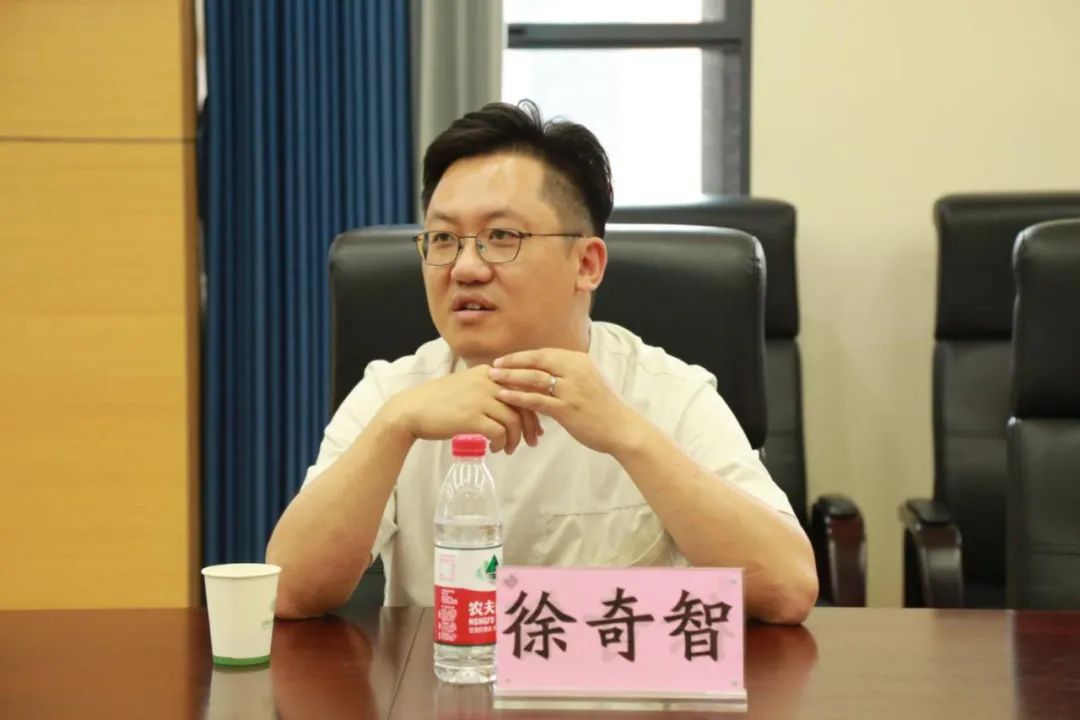
[Editor's note] On June 12, Baohe District, Hefei City announced the appointment of Wang Yong, a professor of the Department of Automation, University of Science and Technology of China, and Xu Qizhi, deputy director of the New Media Research Institute of the Advanced Technology Research Institute of the University of Science and Technology of China, and other six people to serve as science teachers for several primary schools. Vice-Chancellor. In the future, there may be a large number of college professors who will be hired as vice principals of primary and secondary schools. The following is the self-report of Wang Yong and Xu Qizhi.

On the morning of June 16, Wang Yong gave a lecture on the theme "Science, Technology and Development" at the Primary School Affiliated to Hefei Normal University. Image source: Hefei Education Bureau
Profile of Wang Yong
From October 1978 to July 1982, he studied in the juvenile class of the University of Science and Technology of China, and graduated one year in advance from the Department of Radio Electronics, majoring in automatic control, with a bachelor's degree in engineering. He is currently a professor and doctoral supervisor of the Department of Automation, University of Science and Technology of China, director of the Vibration Control and Motion Control Laboratory; person in charge of the doctoral program of navigation, guidance and control; person in charge of electronic information engineering for postgraduate education at the University of Science and Technology of China; teaching in Anhui Province famous teacher.
The following is Wang Yong’s self-report:
I myself did not receive much education when I was a primary school student, and I only attended primary school for 3 years; I have never served as a primary school teacher in my life experience, and I never thought that I would also serve as a primary school principal later in my career. But since people trust me so much, and in order to fulfill the "social responsibilities and obligations of a university professor", I happily applied for the job and tried my best to do a good job.
In the half a month after receiving the letter of appointment, I have participated in two activities of the Primary School Affiliated to Hefei Normal University: one was to listen to an open class on primary school science education, and I gave a "science and technology" to the science teachers present. lectures; and as a science teacher, I participated in a recording activity of "Science Education Competition Class".
"Transfer correct knowledge to children and maintain their curiosity"
I believe that science education in primary schools should try to convey correct knowledge to children and maintain their curiosity about the unknown world.
First of all, accurate and correct knowledge must be conveyed without misconceptions. It is a pity that there are still some unoptimistic situations in our classrooms and even in our textbooks.
In a certain science class, I heard the teacher say that there are 8 planets in the solar system, and used this as an introduction to further science teaching activities. I was surprised, shouldn’t we talk about the “Eight Planets”? We know: there are many asteroids in the solar system (more than 1 million according to the latest statement), we learned the "nine planets" when we were young, and the "eight planets" after "Pluto" was expelled. When I picked up the textbook from the side, I found that what was written in the textbook was 8 planets. Although in the later course process, teachers and students have mentioned that there are many asteroids besides these 8 planets, but why the textbook does not clearly mention the concept of "eight planets", why not simply mention it from "nine planets" The scientific cognitive process from "Big Planet" to "Eight Big Planets" could have stimulated students' interest even more.
Furthermore, curiosity is extremely important for children. It is the basis for developing a desire for inquiry and cultivating concentration. When my child was able to read, he asked us to subscribe him to science fiction publications, and often took the initiative to exchange some stories in science fiction journals with us. At this time, we will discuss with him enthusiastically. For some problems, we will also learn about the past and present of related science and technology, and look forward to the future development together. This has kept him interested in the development of new technologies.
In a family environment, it is neither necessary nor possible to teach children specialized scientific knowledge in a serious manner. I think every child is full of curiosity about new things. As a parent, you don’t need to pursue them deliberately. As long as you don’t stop or discourage them, that’s fine.
Of course, it would be better to consciously encourage and guide. For example, you can study together with your children, discuss some issues of common interest, you can say "I don't know too well, but we can figure it out together", and then encourage your children to search for answers online or go to the library to look up some professional knowledge. books so he might be more interested.
Nowadays, many parents only want their children to learn the courses quickly. They will say, "Don't read idle books, it is important to do well in the courses." "Your scores are not high yet." This will inadvertently destroy the A child’s curiosity and enthusiasm.
“There is too much wishful thinking in our education”
Not long after I became a professor, I once asked an old man "how to be a good professor". He said: "I hope you will not only be an excellent scientist. I don't worry about this, because the environment and enterprising spirit will encourage you to make unremitting efforts in scientific research; I hope you can often think about how to become an excellent scientist at the same time." educator."
This sentence has a great influence on me. Over the years, I have been working hard in this direction, trying to explore some laws of education. Years of practice and thinking have made me realize that educational research is a very difficult thing, because from the time an idea is proposed, through practical testing, optimization and iteration, to widespread recognition, the cycle is very long and there are many influencing factors. It is not that what we think is logically correct will definitely have good results. In reality, many so-called educational reforms and innovations have been proved to be wishful thinking and self-righteousness after a period of time.
What I want to say is that we cannot be wishful thinking. And our educators, and even some education experts, are prone to wishful thinking and impose educational concepts that they think are correct on young educated people.
There is a common phenomenon at present. Many graduate students, especially graduate students in science and engineering, have good research results, but their papers are not well written, especially the language expression is not fluent.
In contrast, although Yang Zhenning has not been learning to use Chinese for a long time, and his language environment and working language after the age of 23 are English, his Chinese expression ability has always been very good, and he can even write ancient poetry. If you want to study more extensively and deeply, you may find that almost all people who have received private school education have very strong language skills. In my opinion, the requirement to recite elementary school classics in private school education is decisive.
Another example is: Once I saw a child of about 10 years old roller skating in the square. The movements were very complex, fast and difficult, but he skated very skillfully and lightly. He learned from his father who was watching him that he had only practiced for a short time. This blew my mind! I thought, if any of us adults were asked to put on roller skates and protective equipment, even if they were learning under the guidance of professional teachers, would they be able to learn so fast? Can it be so delicate? I don't think so, and probably most adults don't. Why? I think that the ability to learn and master this skill is closely related to age.
Going back to the previous question, I think: the biggest advantage of the early childhood stage is mechanical memory and simple imitation, not memory based on understanding. Experts always think that memory without understanding is unscientific, and memory that cannot be remembered is scientific only if it is based on understanding.
We should have given full play to the characteristics of young children. In the elementary school stage, let the children memorize more classic model essays by rote, and they will never forget them for a lifetime. But the current practice is to ask them to understand first, and then remember "on the basis of understanding", but in fact, the effect of doing so may be compromised. Follow the order of word recognition, word formation, sentence making, looking at pictures and speaking, step by step, and finally writing. When studying texts, we always try to let students understand first and then summarize the main idea of the paragraph, the central idea, etc. These practices may seem reasonable, but they violate the basic principle of teaching children according to their age and waste the prime time of memory. I think this is a typical example of too much "wishful thinking" in the current educational thinking.

Xu Qizhi. Photo provided by interviewee
Introduction to Xu Qizhi
He studied at the University of Science and Technology of China for his bachelor's degree, master's degree and doctoral degree. My undergraduate major is English for Science and Technology, my master's degree is science and technology communication, and my doctoral degree is majoring in philosophy of science and technology. He is currently a teacher in the Department of Science and Technology Communication of the University of Science and Technology of China, deputy director of the New Media Research Institute of the Advanced Technology Research Institute of the University of Science and Technology of China, and deputy director of the Anhui base of the National Youth Science and Technology Counselor Training Base.
The following is Xu Qizhi’s self-report:
There is no difference to me between being a university teacher and being a primary school vice-principal. Because I am engaged in scientific education research. I need to go to campus, communicate with teachers and classmates, practice new scientific education theories and methods together, collect and analyze data, and further improve the content and methods of teaching courses.
“Know what it is, know why it is”
In the early days, my science popularization targets were mainly adults. I drew scientific research achievement posters and magazine covers for world-leading scientific magazines such as Nature, Science, and Cell, turning abstract papers into vivid scientific pieces. Images allow ordinary people to understand top journals.
In short, it is to disseminate obscure scientific principles to the public in an easy-to-understand way. After a period of time, I found that popular science "doesn't work" for adults. At most, it only transfers some knowledge, but it is difficult to change their fixed thinking.
This fixed thinking is reflected in all aspects. For example, in the process of raising children, I often had conflicts with my family. When a child has a fever, my family believes that the child should be covered tightly and the fever can be reduced by sweating. But the scientific approach should be to take off your clothes in time to dissipate heat.
On the contrary, when educating children, I found that they can quickly accept new knowledge. "You are young, I am young, and others are young." Since you can teach your own children, you might as well let all children learn. I think this is a very meaningful thing.
I really started to engage in youth science education when I observed a high school chemistry course. After class, I chatted with the lecturer and asked how to explain to the students how to cut the diamond unit cell and how many atoms there are in the unit cell.
His answer was: No teaching, just write down the specific numbers. Because the class time of each course is limited, and even if you spend two or three classes explaining it, you may not be able to explain this abstract problem. In the exam, this may only be a multiple-choice question. Therefore, the most cost-effective way is to let students memorize it.
I continued to ask, what if other crystal structures were tested? His reply was: There are only a dozen common crystals in the college entrance examination, just memorize them all.
I am surprised that the core of science education has changed from the cultivation of scientific thinking and scientific spirit to the simple recitation of scientific knowledge. If things go on like this, students will not think about how knowledge comes from, but will be left with an inherent impression that scientific knowledge is certain and there are only right answers and wrong answers. This goes against the nature of science, as scientific knowledge is uncertain.
The correct teaching method should be "knowing what is happening and why." Therefore, in 2016, I launched the "Spark Academy" project, hoping to create a complete scientific visualization teaching resource library for primary and secondary school teachers to help teachers use visualization technology to explain important and difficult points in science.
My children are now in elementary school and like these popular science products very much. They often read the content of Spark Academy, such as the book "Sound, Light and Heat Energy". In the section on the scene of sound, there is a small visual experiment that children can do through The interactive operation removes the air from the bottle and feels the change of the ringing sound in the bottle.
For older children, visualization techniques can also help them understand more complex scientific knowledge. Taking chemistry as an example, dissolution and ionization are macroscopic phenomena. Teachers allow children to observe them through experiments and tell them the equation of ionization. However, between the symbols of equations and macroscopic experimental phenomena, there is a lack of microscopic movement, and children cannot understand that "dissolution is a dynamic equilibrium." Visualization technology can just make up for these microscopic processes that are invisible to the naked eye, acting as a bridge between abstract symbols and macroscopic life experience.
Not only microscopic phenomena, but also huge on the scale of the solar system, ephemeral on the scale of electrons, long on the time of plate drift, and extremely abstract concepts such as relativistic quantum mechanics, are all visualized Its use in science education.
At present, Huohua Academy has become the world's largest scientific visualization teaching resource library, which has been applied in more than 40,000 schools across the country, with more than 300,000 teacher users, benefiting 20 million primary and middle school students.
Focus on developing core competencies
The biggest advantage of Chinese education is that students have sufficient knowledge and have a solid grasp of basic knowledge. While maintaining this advantage, students must also master deep thinking skills, which brings huge challenges to teaching reform.
In my opinion, this means using new information technology in the classroom and making good use of class time so that students can understand new knowledge in class and remember it after listening. When classroom efficiency is improved, after-class workload is reduced, and students have more time to develop core competencies. I think this may be the direction of education reform.
I have been emphasizing thinking, core literacy, and underlying literacy. For an individual, the knowledge that can be mastered is always limited. In the era of information explosion with rapid technological advancement, what we face every day is more of our "unknown" knowledge rather than "known" knowledge. Children should achieve better individual development and make rational decisions in the unknown, so as to make life more happy and less negative, including critical thinking, creative thinking, communication skills, learning skills, leadership skills, and information literacy The core competencies play a vital role. Compared with the amount of knowledge that the human brain can memorize, these underlying qualities play a more critical role in life.
In my opinion, the scientific thinking of young people should be cultivated from the following aspects: First, let them participate in the process of knowledge production, rather than simply telling them the final result. The process of knowledge production includes observing phenomena, summarizing, asking questions, exploring causes, judging whether conclusions are accurate, etc.
The second is to develop the habit of looking at problems from multiple perspectives and conducting comprehensive assessments. For various phenomena in society and various things that happen in life, children need to gradually get rid of a single evaluation standard, evaluate the same thing from various angles, master different evaluation standards, and understand that different evaluation standards may By bringing about different results, you can view disputes more rationally and treat others peacefully.
The third is to master the rational thinking with argument as the core, and be able to distinguish what is evidence, what is opinion, whether the evidence supports the opinion effectively, and whether there is argumentation fallacy. For any information, you can think in this way before accepting it or making a decision, instead of blindly following it.
Since I was employed as the vice principal of a primary school, I started from "brainwashing" teachers, conducted some training, and wrote "Scientific Knowledge Literacy Cultivation in the Age of Artificial Intelligence" and "What is Science?" " Lecture.
At present, I am writing the book "Thinking Club", which is aimed at senior primary school students. Through the ups and downs of the storyline, it interprets the process of scientists, philosophers, and thinkers exploring knowledge. I hope to make the cold science vivid and warm, and use the flower of ideas to inspire young people's enthusiasm for knowledge.
(Original title "Top university professor wants to be the vice principal of an elementary school")